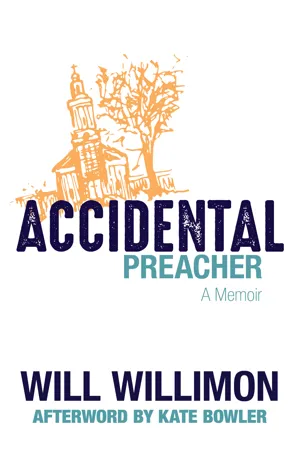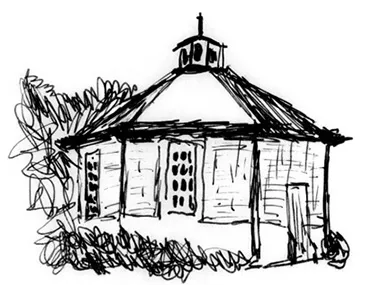![]()
1
Fortuitous Baptism
In the beginning God created the heaven and the earth. And the earth was without form, and void; and darkness was upon the face of the deep. And the Spirit of God moved upon the face of the waters. And God said, Let there be light: and there was light. And God saw the light, that it was good. (Genesis 1:1–4)
I never meant to be Methodist. Didn’t have to. My forebears allegedly founded octagonal McBee Chapel Methodist Church in the 1830s. (On the back of the second pew to the rear right, you can still see R0y ROjERs carved by my brother Bud one Sunday as my mother dozed.) Riding home from church, transfixed by a passing field overcome with kudzu (the one crop that cooperated with the Willimons), I asked, “Am I a Christian?”
Mother answered, “Of course. And Methodist, by virtue of your father’s family. You were christened in Mama’s living room—after the preacher consumed a fried chicken, three ears of corn, and a peck of okra. Sad man. Vanderbilt Phi Beta Kappa but, because he was a Methodist preacher, none of his five children could afford college.” She sighed. “The sacrifices God requires of a preacher’s family!” (I had already heard rumors of what God told father Abraham to do to his boy on Mount Moriah, so I was unsurprised by God’s rough handling of our preacher.)
“But what if I don’t want to be Methodist?” I persisted.
“That will not be possible,” she replied.
Luther said baptism is a rite that takes only a few moments to perform but your whole life to complete. The Christian life is spent figuring out what baptism got us into. Though I eventually had theological qualms about the manner of my baptism in my grandmother’s living room by a well-educated, underpaid, overstuffed preacher, it seemed right that one was made Methodist Christian without having say in the matter. Jesus’s yoke, desired or not, came with all the other commitments made for, rather than by, you. Zwingli compared baptismal naming to the bestowal of a monk’s cowl. The clothing of a monk came in one size. When a boy joined a monastery, he received a cowl fit for a man. The child probably looked ridiculous wearing a grown man’s robe. Yet with time, the young monk grew to the cowl until one day it fit.
So with baptism, the name “Christian” is superimposed on our family name. It’s absurd to call a little baby, squalling in his grandmother’s living room after Sunday dinner, “Christian.” Yet that’s just what the church does until, sooner or later, the promises of baptism are fulfilled; we have become that person who the church promised we would be. Somebody calls out, “Christian,” and we answer because, by the grace of God, the name fits.
As the implications of my baptism unfolded, I discovered what Barbara Brown Taylor said of the descending Holy Spirit in Jesus’s baptism—“This dove has got a set of claws.”
***
But enough about God; back to me.
Rosy-fingered dawn lights the window, revealing a boy abed on a warm May morning three days before his eighth birthday. The night chorus of crickets is silent. A thrush, a robin, and maybe a wren sing to the breeze that sways the surrounding pines. A distant tractor—by the sound, Uncle Charles’s John Deere diesel—works the field behind the woods. From the kitchen, a pan clangs as Mother makes breakfast—grits, inevitably.
The pine-paneled bedroom had been passed to me by my much older brother Bud when he escaped Greenville for the navy. This, my world—the room encrusted with curiosities from fields and woods, the rock house in the middle of a pine forest in the Carolina Piedmont, nearest neighbors a quarter mile down Fork Shoals Road—alone, but for my mother.
She had designed the house on two sheets of paper. As she said, “Furman Carr and a colored man named James” built the house before I was born, using posts and planks cut at the family sawmill, with the house veneered in reddish fieldstone salvaged from the chimneys of abandoned tenant houses that were once homes for the twenty families who worked my grandfather’s cotton farm.
By the time I arrived the sharecroppers had bolted. The once thriving “Willimon Place” was two thousand acres of memory in red clay. The dozen barns were bare, the fields were briars and bitter weed, though the forsaken Willimon Cotton Gin was well used, perfect for Saturday enactments of The Lone Ranger. Each irregular red rock that covered the house where I awakened came from a little world where nobody moved in and few left, even the dead.
In Scripture, God knows everybody’s name. Sometimes when God calls, God changes their names; Saul famously became Paul, Abram shifted to Abraham, Sarai to Sarah. The disciples are just so-and-so’s son until Jesus puts the finger on them, and thereafter they are Andrew or Peter, suggesting that theologian Karl Barth is right: one is not a full person until one is addressed.
I awoke to my name—Willy or sometimes Billy in my first decade—in the pine-paneled room in the rock house in the middle of a cluster of pines. Mother preferred William, because I was named for my grandfather, the recently departed, well-admired patriarch William Henry Willimon, who South Carolina Families claimed was “benevolent to all his hands, colored and white.”
“Papa,” William Henry Willimon, had been named for his father, William Henry Abraham Willimon, who graduated from the University of Kentucky with a diploma in “Railroading, Boiler Making, Accounting, Animal Husbandry, Business, Law, and Rhetoric.”
When he returned from the Civil War, W. H. A. Willimon slept on the floor rather than a bed for the rest of his days as atonement for the South’s loss. When my mother died, I was given the chest where William Henry Abraham Willimon kept his Confederate uniform, though by that time his prized gray outfit was dust. All that was known of family prehistory was “our people came to the upcountry from down near Charleston.” Beyond that, history was silent until Jacob and Esau, Cain and Abel, Adam and Eve.
On the first day of fifth grade my strange-but-occasionally-nice teacher signaled that “William” was unsatisfactory. She much preferred Will—“Dr. Will Fewell spent his life curbing drunkenness in Greenville. Will Rogers was a wonderful man. Died in the crash of Wiley Post’s plane. You shall be Will.”
It stuck. Thus I learned you couldn’t choose who you wanted to be. God called the light good, then named Adam and Eve. One night, Abram got renamed Abraham and couldn’t do anything about it. In Bethlehem, Jesus was prenatally named by an angel. Saul became Paul. In Greenville, an old maid schoolteacher—who taught that Franklin Roosevelt had a bossy wife, and Harry Truman was Missouri white trash—named you. Names were accidents, additions that make you, you—Will, Sandlapper, Democrat, Methodist. Names are bestowed or imposed, gifted or coerced, depending on how you look at it.
***
Christians are obsessed with history not only because that’s where God incarnates but also because, as Moses discovered (Exod. 33:20–23), God is most safely and accurately viewed through a rearview mirror. James Baldwin, in “The Price of the Ticket,” said that you must do history: go back to where you began, tell the truth about it, and then do it over. We have more future with God than past, Kierkegaard said, and though life must be lived forward, life is only understood backward, making historians of us all.
The American South has produced more history than it has been able to consume. Most of life that was handed me was in the past tense—ruins of tenant houses; the deserted black church surrounded by a ruined cemetery; six threatening, dark, dangerous abandoned wells; two fishing ponds; a dozen empty barns; a handful of Confederate Reunion medals. My people savored the past, chewed it, and regurgitated it to nourish the nestlings.
Why had no one filled those menacing wells? One uncle explained, “To teach boys to watch where they’re going. My boy, experience, you will find, is a most vauable teacha. If hit don’t kill you.”
***
For an imaginative boy, rusting farm machinery, cleared of honeysuckle and kudzu, became a bomber for thirty seconds over Tokyo. If you taunted death by climbing the creaking stairs, then clambered up the ladder to the topmost of the big barn, you could push back the rusted tin and see all the way to Greenville, even to the Blue Ridge beyond. My mother claimed that the cotton gin was once “the center of economic life in this part of the county.” By the time I got there, it was Camelot.
Harry Crews opens his autobiography, A Childhood, with this: “Nothing is allowed to die in a society of storytelling people.” Perhaps an inchoate desire for immortality, a sense that they were a dying breed, made Willimons virtuoso storytellers.
During one Sunday dinner somebody in law enforcement was labeled a “Neanderthal Baptist from Pendleton.”
“Pendleton is pathologically archaic,” chimed an uncle.
“So backward,” discoursed Uncle Henry, “that when Jesus returns the only place he’ll recognize is Pendleton.” Guffaws of agreement around the table.
“That’s ridiculous,” countered Uncle Gene (who once took a football thirty yards down the Clemson field in the wrong direction before being tackled by his own team). “America wasn’t discovered until 1492. Pendleton wasn’t even here when Jesus was.”
When a cousin left for Clemson, thus opening a space at the table, I joined in the dinner talk. I was formally initiated by an uncle: “One day Papa—you’re his namesake, Willie—came home from the office and put on a pair of overalls and began rakin’ the front yard. A man ambled down Fork Shoals, stopped, leaned against the fence, and tried to be sociable.
“ ‘Mighty hot day to be out working,’ the man said to Papa. Papa just nodded and kept rakin’. Unlike Mama, Papa didn’t take much to talking with people he didn’t know.
“ ‘Can’t believe that rakin’s worth doin’ in this heat,’ said the man.
“ ‘Still got to be done,’ said Papa, aggravated.
“ ‘Yep, I always heard these Willimons was sons-a-bitches to work for,’ said the man.
“Papa run that man way down the road with his rake.” Gales of laughter.
Stories helped us make sense and mount a defense. In my formative years, Grandmother’s Sunday dinner table was a stage for elaborate public narration of the past. When the bucket was let down for life-giving refreshment, stories were all the family had to pull up—long, involved tales of prosperity before Sherman’s troops came through “like an army of ravening locusts, I tell you,” and stole or burned everything “they couldn’t cart off.” Legends of outlandish moments in the lives of uncles and aunts on visits to Chicago or Charleston; memorable last plays in Clemson football; dark, whispered shenanigans of trash who lived down the road and were rumored to be Republicans; and testimonials to loyal “Negroes” who, in times of trouble, showed more smarts than “most white people.” Stories kept the family going as the Hebrews were given manna in the wilderness. Adults didn’t spend much time thinking about what’s next; in their stories, tomorrow would never match yesterday.
Years later an ingrate reviewed my big book on Barth, saying, “Willimon rambles; still, the ramblings are the best of his book.”
Some afternoons with my dog, I visited the foundations of my great-grandfather’s house, the very spot where my heroic great-grandmother buried the silverware when the Yankees came through laying waste a perfect world. “Do you have a mother?” she reputedly asked one of the Yankees as family treasures were looted. “How the poor woman must grieve that she bore the likes of you!”
I walked off the lines of the foundation, baffled that the manor (“one of the grandest houses in Greenville County”) was smaller than I had been led to believe.
Each afternoon I shuffled from the school bus stop—where Ashmore Bridge Road meets Fork Shoals at the old gin—to my grandmother’s house. (I rode the yellow bus for an hour each way, never questioning why we passed by three “colored schools.”) At Mama’s, a quarter of a mile down Fork Shoals, I sat enthralled by her stories as I awaited Mother coming home after her day of teaching at Greenville High.
Our home was a matriarchy. Each weekday ended with my mother, after clearing the dishes, setting up shop on our dining room table, grading papers or working on the next day’s lesson into the night. After my mother’s death, I received condolences from her supervisor at the state board of education: “Never did your mother enter her classroom unprepared. Her lesson plans were a mixture of creativity and realism, wonderfully focused. She cared for each of her students, but never more than she cared for the inculcation of the subject.” The night before her funeral, a grief-stricken, unknown woman came through our receiving line wailing, “Your mother taught me how to do a cheese soufflé that doesn’t fall!”
I’ve not had a day as physically and intellectually demanding as my mother’s average day at Greenville High. When one of my readers complained that I overloaded my writing with words nobody uses, I explained, “Winn-Dixie gave away coupons with groceries. One year a hundred coupons won your choice of an unabridged Webster’s dictionary or a set of ice-tea glasses. Proudly my mother lugged home a five-pound Webster’s, the only person in Greenville to take the dictionary rather than the glasses.”
My grandmother, “Mama,” though crippled with arthritis, heroically tried to supervise the farming of eleven hundred acres. Even ...






